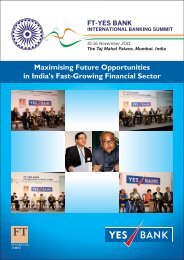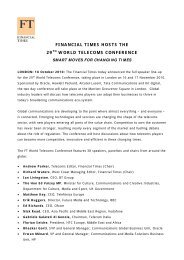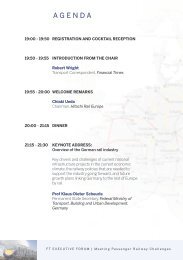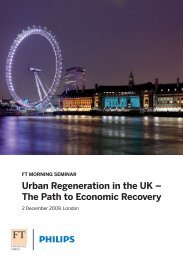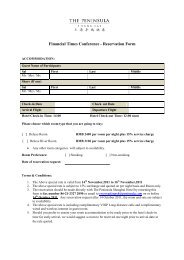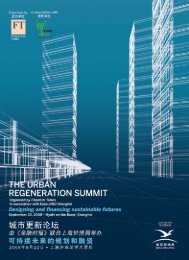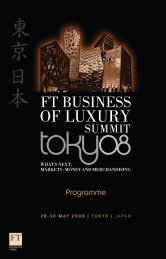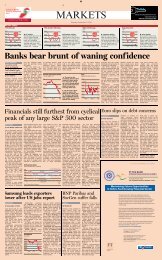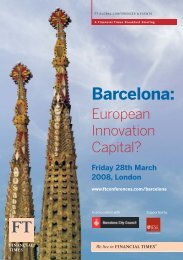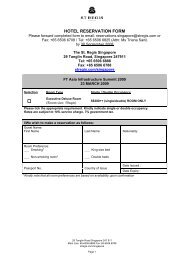FT SUSTAINABLE BANKING AWARDS 2009 Emerging Markets ...
FT SUSTAINABLE BANKING AWARDS 2009 Emerging Markets ...
FT SUSTAINABLE BANKING AWARDS 2009 Emerging Markets ...
Create successful ePaper yourself
Turn your PDF publications into a flip-book with our unique Google optimized e-Paper software.
committed to finance projects developed in socially fair and environmentally responsible fashion, based<br />
on internationally recognised criteria such as Performance Standards by IFC - International Finance<br />
Corporation. The Equator Principles are also applied when the bank simply acts in project structuring<br />
consultancy. In the socio-environmental analysis and monitoring of large enterprises (US$ 10 million<br />
plus), it provides benefits for the banks, its clients, and the entire society.<br />
Socio-Environmental Risk Analysis – examples of assessed items<br />
• Use of child labour in hazardous and/or exploration way<br />
• Environmental Legislation<br />
• Sector Directives<br />
• Public Information.<br />
In the scope of the function and endeavoured to expand its socio-environmental awareness, add value<br />
to debates, and boost the financial sector in that direction, we led, in partnership with IFC and other<br />
Brazilian banks signatory of the Equator Principles, in December 2008, the organisation of the Regional<br />
Latin-American Meeting celebrating the 5th Anniversary of the Equator Principles. Gathered in Rio de<br />
Janeiro, important actors in the global socio-environmental scenario celebrated the milestone and<br />
debated the challenges that lie ahead.<br />
CAPACITY BUILDING: How has your organisation built capacity to manage sustainability issues?<br />
Please describe specialist hires and/or groups who have received sustainability training. (400 words<br />
max)<br />
There are qualification programmes for specialists and managers with modules in sustainable finance<br />
management, comprehending the focus on transforming values for a more effective sustainability<br />
action. E-learning in Sustainability is a way to reach the largest possible number of employees,<br />
approaching the main gaps of the institution regarding the topic and introducing concepts and values<br />
required to internalise the sustainability issue.<br />
Complementing the action, in 2008, Itaú held two editions of its event called Itaú Sustainability<br />
Dialogues for employees aiming at deepening their understanding and for mobilisation. The selected<br />
theme was “Recycling under Different Views”. The meetings relied on the participation of the Papel<br />
Voluntário NGO and the Business Commitment for Recycling (CEMPRE), and also gave space for<br />
other companies report their experiences. The event was attended by 307 employees from Itausa<br />
Business Centre and Technical Operational Centre.<br />
Itaú employees are also target in the campaign Conscious Use of Cash, Credit Card, and Credit.<br />
Extended to the internal public since 2007, the initiative aims at keeping the team’s well-being, by<br />
preventing employee indebtedness, and guiding them in case their debts would possibly impact their<br />
performance and life quality.<br />
Unibanco created the Sustainability Leaders, a group that gathers 35 employees from several areas<br />
aiming at disseminating the concept throughout the organisation and at implementing projects in their<br />
own sectors. Leaders are distributed in 12 working groups (GTs) and one study group, coordinated by<br />
the Sustainability area. Each GT prepared its action plan including design of strategies, formulation of<br />
policies, and minor daily changes.<br />
In order to prepare action plans that would allow reaching established goals, Leaders attended<br />
meetings and training. One of such was the Training on Sustainable Finances promoted by Unibanco<br />
and conducted by Fundação Getúlio Vargas and Fábrica Éthica.<br />
Itaú Unibanco relies on an extensive network of partnering specialists for lectures to employees and<br />
specific training. Some examples are:<br />
• Support to British consultants SustainAbility and the Brazilian Foundation for Sustainable<br />
Development (FBDS) in preparing the Way to Credibility study, analysis of leading sustainability reports<br />
in Brazil;<br />
• Membership with the Institute of Social and Ethical Accountability, part of a global network of<br />
companies committed to sustainability;<br />
• Since 2007, Itaú is part of the Benchmark Group in Sustainability Strategy, Ethos Institute of<br />
Corporate Social Responsibility (GRES);<br />
• Itaú and Unibanco are part of the Centre for Reference in Sustainability, coordinated by<br />
Fundação Dom Cabral, promoting studies and debates on sustainable development.



